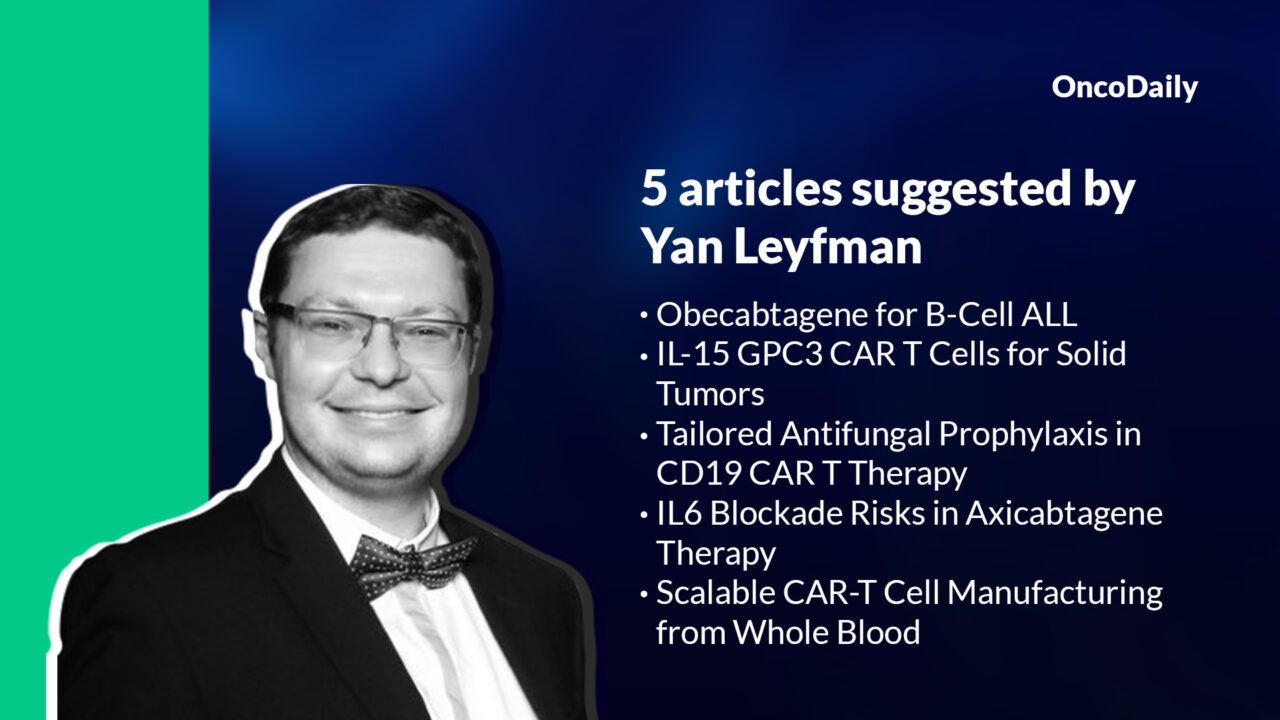
Five articles suggested by Yan Leyfman
Yan Leyfman MD is the Co-founder and executive director of MedNews Week. He is also the medical correspondent at OncLive. He is also the Executive Committee Member at Music Beats Cancer. He is a Clinical Researcher at Icahn School of Medicine at Mount Sinai. His research interests include oncology, Immunooncology, Cellular Therapy, and Immunotherapy.
He suggested following few must-read papers on LinkedIn:
- “In a Phase 1b-2 study for relapsed/refractory B-cell ALL, obe-cel an autologous 41BB-ζ CAR T-cell which uses an intermediate-affinity CAR to reduce toxic effects and improve persistence 77% achieved remission with a median event-free survival of 11.9 months and low severe toxicity rates (CRS 2.4%, ICANS 7.1%).”
Obecabtagene Autoleucel in Adults with B-Cell Acute Lymphoblastic Leukemia
Authors: Claire Roddie, Karamjeet S. Sandhu, Eleni Tholouli, Aaron C. Logan, Paul Shaughnessy, Pere Barba, Armin Ghobadi, M, Manuel Guerreiro, Deborah Yallop, Mehrdad Abedi, Jeremy M. Pantin, Jean A. Yared, Amer M. Beitinjaneh, Sridhar Chaganti, Katharine Hodby, Tobias Menne, Martha L. Arellano, Ram Malladi, Bijal D. Shah, Luke Mountjoy, Kristen M. O’Dwyer, Karl S. Peggs, Pierre Lao-Sirieix, Yiyun Zhang, Wolfram Brugger, Edgar Braendle, Martin Pule, Michael R. Bishop, Daniel J. DeAngelo, Jae H. Park and Elias Jabbour
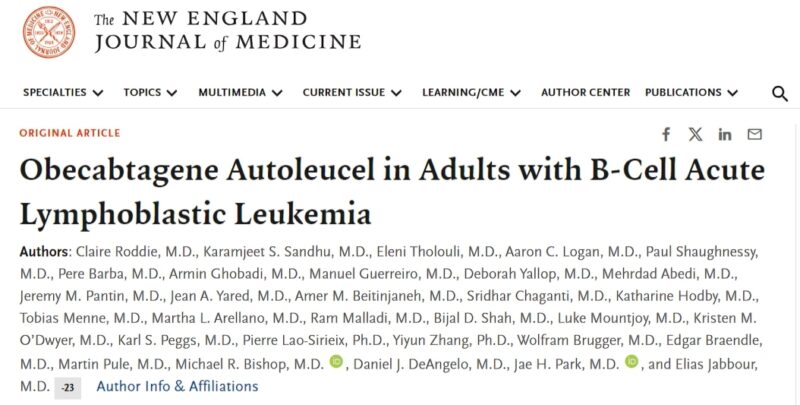
2. ‘Study from Baylor College of Medicine showed that IL-15 enhances the effectiveness of GPC3-targeting CAR T cells in solid tumors by boosting their expansion, survival, and antitumor activity. In a clinical study, IL-15 co-expression increased response rates to 33% and disease control to 66%, though it also raised cytokine release syndrome risk, which was manageable. Tumor-infiltrating CAR T cells in responders showed beneficial epigenetic and immune activation changes, highlighting IL-15’s potential to improve CAR T cell therapies for solid cancers.”
Interleukin-15-armoured GPC3 CAR T cells for patients with solid cancers.
Authors: David Steffin, Nisha Ghatwai, Antonino Montalbano, Purva Rathi, Amy N. Courtney, Azlann B. Arnett, Julien Fleurence, Ramy Sweidan, Tao Wang, Huimin Zhang, Prakash Masand, John M. Maris, Daniel Martinez, Jennifer Pogoriler, Navin Varadarajan, Sachin G. Thakkar, Deborah Lyon, Natalia Lapteva, Mei Zhuyong, Kalyani Patel, Dolores Lopez-Terrada, Carlos A. Ramos, Premal Lulla, Tannaz Armaghany, Bambi J. Grilley, Stephen Gottschalk, Gianpietro Dotti, Leonid S. Metelitsa, Helen E. Heslop, Malcolm K. Brenner, Pavel Sumazin and Andras Heczey
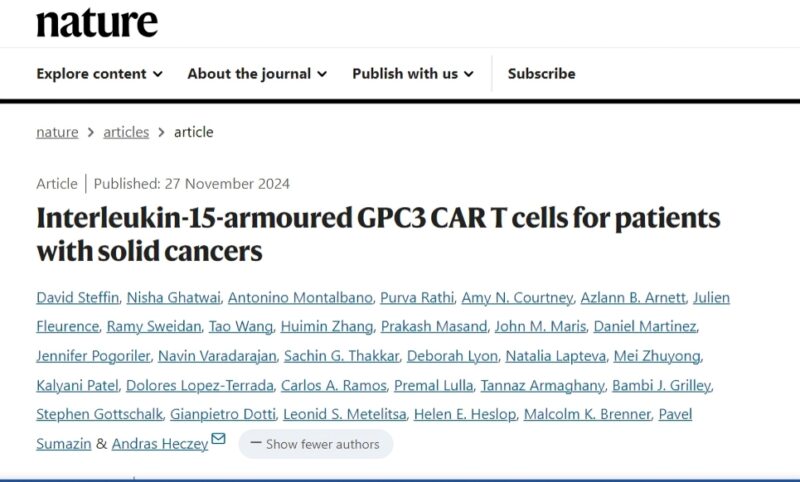
3. “An important study from Memorial Sloan Kettering Cancer Center discussing fungal prophylaxis for high risk lymphoma patients.”
Authors: Giovanna Melica, Alejandro Luna de Abia, Gunjan L. Shah, Sean Devlin, Magdalena Corona, Joshua Fein, Parastoo B. Dahi, Sergio A. Giralt, Richard J. Lin, M. Lia Palomba, Allison Parascondol, Jae Park, Gilles Salles, Amethyst Saldia, Michael Scordo, Roni Shouval, Miguel-Angel Perales and Susan K. Seo
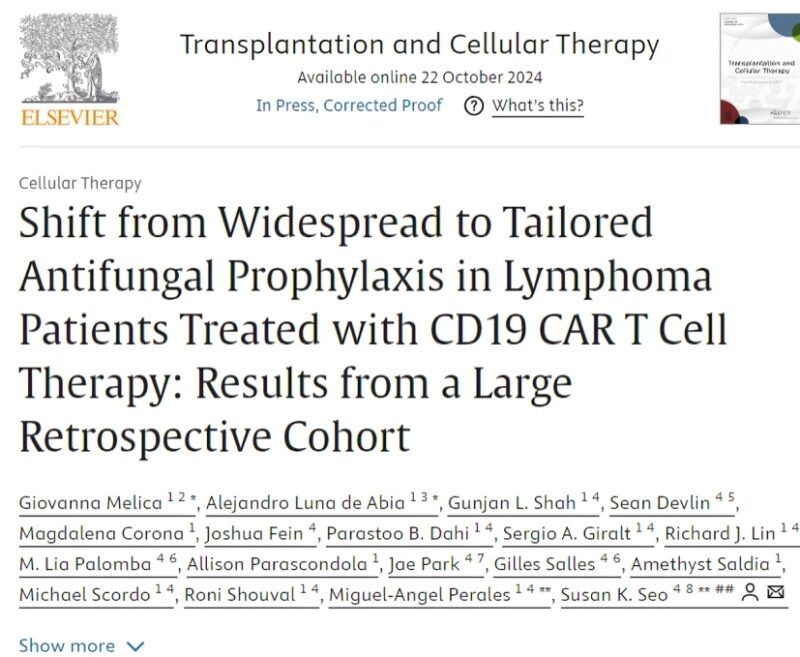
4. “Study led by Dr. Jae H. Park at Memorial Sloan Kettering Cancer Center found that using tocilizumab, an IL-6 receptor blocker, prophylactically may reduce the risk of severe cytokine release syndrome (CRS) in patients with large B-cell lymphoma (LBCL) undergoing axi-cel therapy.
However, this potential benefit comes with a trade-off, as the treatment may also increase both the incidence and severity of neurotoxicity, underscoring the importance of carefully weighing the risks and benefits of this approach.”
Authors: Yannis K. Valtis and Jae H. Park
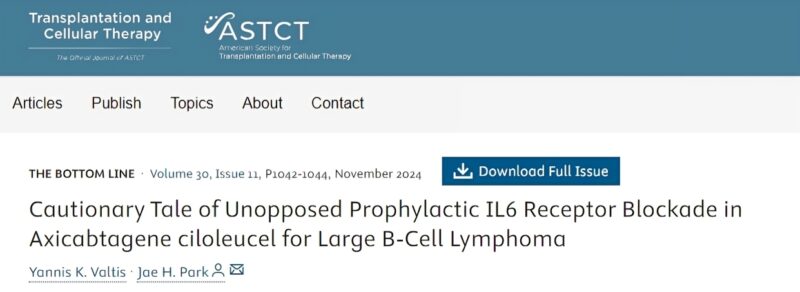
5. “An efficient approach for producing CAR T cells directly from whole blood—offering improved scalability and significant cost savings.”
Authors: Roshini Traynor, Isabella Vignola, Sarmila Sarkar, Michaela Prochazkova, Yihua Cai, Rongye Shi, Sarah Underwood, Supriya Ramanujam, Bonnie Yates, Sara Silbert, Ping Jin, Alexandra Dreyzin, Nirali N. Shah, Robert P. Somerville, David F. Stroncek, Hannah W. Song and Steven L. Highfill
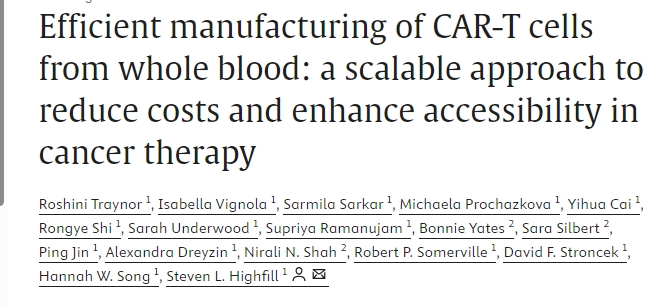
More posts featuring Yan Leyfman.
-
Challenging the Status Quo in Colorectal Cancer 2024
December 6-8, 2024
-
ESMO 2024 Congress
September 13-17, 2024
-
ASCO Annual Meeting
May 30 - June 4, 2024
-
Yvonne Award 2024
May 31, 2024
-
OncoThon 2024, Online
Feb. 15, 2024
-
Global Summit on War & Cancer 2023, Online
Dec. 14-16, 2023
